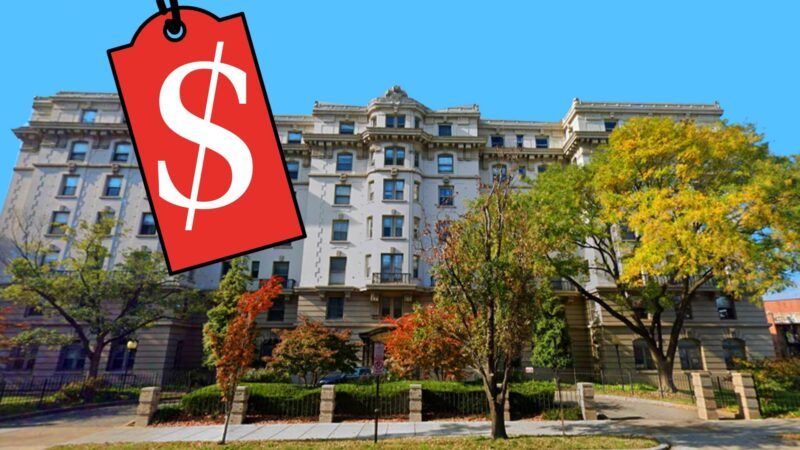Low-Income Condo Residents Say D.C.'s Demand That They Pay for Restoring Historic Balconies Will Force Them Out of Their Homes
The $1.5 million that it would cost to fully replace balconies at the historic Kenesaw apartment building could end up tripling the condo fees of some low-income residents.

Historical preservation officials in Washington, D.C., are demanding that expensive aesthetic renovations be done to a condo building over the objections of the buildings' residents, some of whom are low-income and say the expense of the work will force them to move.
At issue are 25 crumbling balconies sprouting from the third floor of the 115-year-old Kenesaw building in the city's Mount Pleasant neighborhood that currently pose a safety hazard and need to be either replaced or removed entirely.
Replacing the balconies would cost a full $1.5 million, and require applying special assessments on residents ranging from $10,000 to $28,000. That could end up tripling the condo fees of some of the building's 15 low-income households who currently pay below-market rates for their homes, and who say they won't be able to afford the increase.
"The only way they could afford the repairs is to leave," said Neha Desai, president of the building's Renaissance Condominium Association, to DCist, which first reported on the story earlier this week.
The Renaissance Condominium Association and the Kenesaw Phoenix Cooperative, which owns 29 of the building's 87 units, have thus proposed a number of more affordable repair options. That includes a $750,000 plan to replace the 25 balconies with decorative railing.
The idea seems reasonable enough.
Complicating things is the fact that the Kenesaw apartment building is located in not one, but two, of D.C.'s historic districts. That means applications for building permits typically must undergo special review by the city's Historic Preservation Review Board (HPRB) to ensure the proposed work is "compatible" with the historic character of the district.
Those requirements give government officials and neighborhood preservationists an opportunity to butt into Kenesaw residents' own plans for their buildings. Both groups are dead set on preventing the removal of the Kenesaw's balconies.
Doing so "would significantly degrade the architectural integrity of the building as well as the character of the two historic districts to which it contributes," wrote Fay Armstrong, president of Historic Mount Pleasant, in testimony to HPRB.
HPRB staff also recommended that the board reject Kenesaw's plans to remove and replace those 25 balconies, writing in a staff report that "the balconies are an original, distinctive feature. Removing them would not enhance the property, and the loss of the balconies would degrade, rather than retain, its character."
Kenesaw residents made their own pleas to the board to show some flexibility.
"As an owner and senior on a fixed income, I am [concerned] that this project would impact low-income residents greatly and cause a financial burden," wrote one resident in a letter to the HPRB.
"Forcing long-term residents out of the building due to financial hardship in order to preserve the balconies would destroy the spirit of the building. I love the balconies, but not at that cost," said another. "It would be best if DC could subsidize the repair instead of making residents pay an enormous cost. But if the cost can't be subsidized, please allow the removal."
These pleas failed to move the HPRB, which voted unanimously in September to reject plans to remove those 25 balconies.
The board is only supposed to consider the interests of preservation and functional necessity, and if necessary, find some balance between the two. Kenesaw apartment residents have therefore appealed to the mayor's agent, an official who can reverse the HPRB's recommendations if they find that denying a permit would result in "unreasonable economic hardship."
A public hearing where building residents can make their case is scheduled for late January.
Emergency legislation passed by the D.C. City Council also makes the Kenesaw building eligible for $250,000 in grants to help cover the renovation costs.
DCist reports that even with the grant, low-income households would still be facing unaffordable fee increases, which are based on a unit's square footage, not its owner's income.
Special assessments of the kind that Kenesaw residents are being asked to pay are often imposed by governments to cover the costs of infrastructure or a public project.
Typically, these assessments are for projects that provide a particular benefit to the property owners being charged—say a new sidewalk in front of someone's house. Even then, owners can chafe at being charged for a benefit they didn't necessarily ask for.
The inflated special assessments that Kenesaw residents are being hit with are arguably more offensive. The benefits of the $1.5 million balcony replacement are purely aesthetic and accrue mostly to a narrow segment of city residents that like looking at the building.
The people who live inside the building, meanwhile, might not be able to afford to stay there much longer.
Rent Free is a weekly newsletter from Christian Britschgi on urbanism and the fight for less regulation, more housing, more property rights, and more freedom in America's cities.


Show Comments (40)